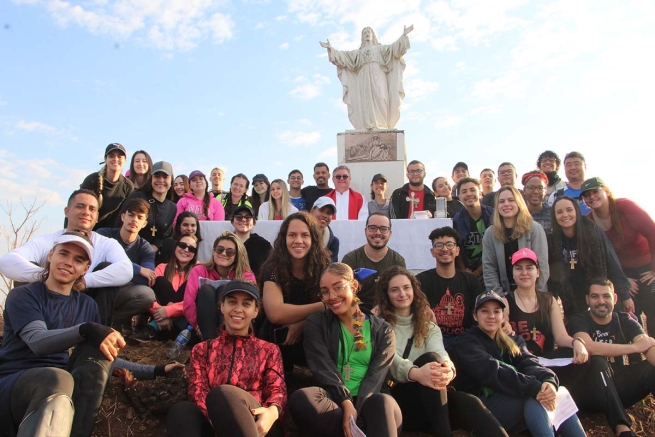Volunteers from the Salesian University played a fundamental role in the activities.
Physical Education students detected the level of physical activity and sedentary lifestyles in the villages, while Biomedicine students obtained information on access to laboratory tests related to “Parasitic infections of the gastrointestinal tract” and other important information related to this topic.
Law students carried out a detailed investigation of the qualification of marriage and the effects of marriage, analysing the concepts, traditions and cultural requirements that shape marriage practices, with particular attention to their legal and social implications.
For their part, the Nursing students collected information on the vaccination schedule of indigenous children from zero to nine years old, based on the records kept by the Basic Health Unit and the operation of the vaccination room. Physiotherapy students analysed people with physical disabilities, collecting data on age, gender, motor disabilities and locomotion aids (such as wheelchairs, crutches, canes and walkers).
Regarding the Nutrition course, the students collected data on body mass (kg) and height (m) to classify the nutritional status of the indigenous people using the Body Mass Index (BMI), while the Psychology students collected psychological data through playful laboratories to analyse the behaviour of the local population.
The Advertising and Public Relations students mapped the media habits in the villages by analysing the interaction with traditional media and the Internet, in particular with regard to access to content on social networks, with the aim of identifying the extent to which this influences them in the school context.
Finally, the medical students were divided into three groups to carry out the following projects: mapping the epidemiological profile of the patients visited in the village; identifying the degree of schooling and leisure activities; identifying eating habits; whether or not they live with animals and whether they use tobacco; analysing the assessment tools used by the health team; which professionals they see regularly; what the flow of health care is and whether there is regular use of drugs.
According to Fr Paulo Jácomo, SDB, Vice-Rector for Pastoral Care at UniSalesiano and part of the VAMS Organising Committee, these activities are to be understood as important stages of anthropological research, with the expectation that the involvement of the university can increase the production of academic material in their respective areas. “Previously most of the data had been collected by the Salesians, but now the university is taking on a crucial role in the development and expansion of this work”.
The Vice-Rector for Pastoral Care also added that the communities served have shown themselves to be open to projects, actively participating in the various activities. The growing involvement has been observed over time and this year has culminated in greater integration. “At the closing party, for example, there were cultural performances that symbolised the achievement of closeness and familiarity between volunteers and communities,” he said.
According to Fr Jácomo, these data will be used by volunteers in the coming years, contributing to the continuity and further academic and community actions. “The integration and familiarity built over time then translate into significant progress and consolidate VAMS as a model of how education can generate concrete actions with a strong social impact,” he stressed.
It is worth noting that the progressive integration achieved between VAMS members and the indigenous community was recorded in images and videos by UniSALESIANO’s communication and marketing professional, Júnio Aquino, who also participated in the expedition.
The Vice-Rector for Teaching, Research and Postgraduate Studies of UniSALESIANO, Prof. André Ornellas, tressed the importance of experiences like this for the integral training of students. “The VAMS promotes significant personal and professional growth of our students and the activities carried out in indigenous communities generate valuable data, contributing to academic and social progress,” he said.
Finally, the Rector of UniSALESIANO, Fr Paulo Fernando Vendrame, SDB, said that VAMS is a transformative project, both for the academic community of UniSALESIANO, and for the indigenous populations that welcome the missionaries. “I am happy that the academic and Salesian aspects go hand in hand in this voluntary action,” he stressed.
Monique Bueno
UniSALESIANO Communications Analyst



